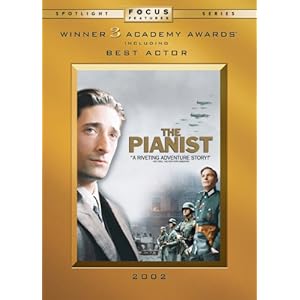
I keep watching Roman Polanski movies and they keep turning out to be really damn good, so I decided to learn about him a little more. I didn't know that he escaped the Holocaust in Poland as a child or that his pregnant wife was murdered by the Manson Family. It obviously doesn't excuse what he did a few years later, but it does change my perspective a bit. He definitely uses his experience in the Jewish ghettos and avoiding concentration camps to realize The Pianist, a similar story about a real man who also avoided the camps before returning to the radio booths and concert halls. Movies about this terrible period history seem like they sometimes rely too much on the obvious horror of what's happening to seem powerful, but there's a certain frankness about the way this movie was shot that makes it all the more effective without trying too hard to shock the audience. The things that happen are brutal and awful to be sure, but they're not sensationalized, just shot naturally and letting the events speak for themselves. We're not forced to feel sorry for these people, we just do.
This simple approach makes the drama effective but also could have made the film a bit dull, if it was just two and a half hours of people suffering. But the pianist's story eventually takes some turns that are a bit less familiar and interesting to watch, and there are also a few moments where the specific nature of the natural approach makes the action immensely compelling. Several scenes where the brutality and violence of the film are at their highest pitch are shot entirely from various upper story windows, which has the effect of distancing you from the visceral nature of what's happening and making it feel completely real in the process. It seems more like a documentary at these moments, and it's more gripping than some of the most expensive action scenes I've ever seen.
Of course there's also Adrien Brody's performance as the titular character. The acting in this movie is generally pretty low key in keeping with the natural style, and not many members of the cast really stick out much. Brody also doesn't do a lot to call attention to himself, but there's a quiet, moving quality to his work that makes his struggle to survive interesting. His transformation from dignified artist to shambling, desperate mess is pretty intense to watch. It's a much more subtle performance than usually seems to get called out at the Oscars, and while I'm sure the status of the film itself helped him along, it seems like a good choice for the award. I have to admit that Polanski was deserving as well, though I probably would have replaced the Screenplay win with a Cinematography one. The script is fine, but the quality of this film is definitely in its execution.
AAAAAGGGHHHH
16 years ago


































No comments:
Post a Comment